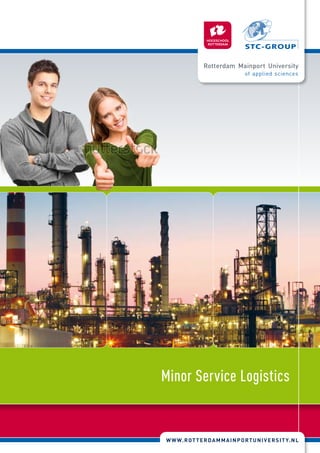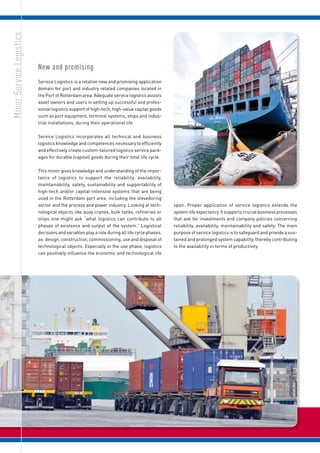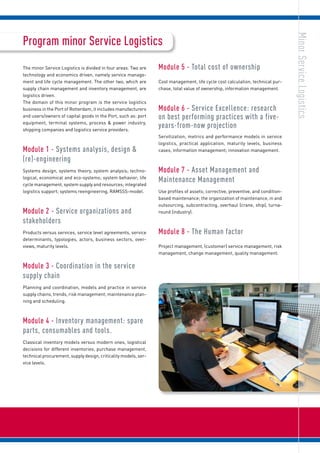Folder Minor Service Logistics
- 2. MinorServiceLogistics New and promising Service Logistics is a relative new and promising application domain for port and industry related companies located in the Port of Rotterdam area. Adequate service logistics assists asset owners and users in setting up successful and profes- sional logistics support of high-tech, high-value capital goods such as port equipment, terminal systems, ships and indus- trial installations, during their operational life. Service Logistics incorporates all technical and business logistics knowledge and competences necessary to efficiently and effectively create custom-tailored logistics service pack- ages for durable (capital) goods during their total life cycle. This minor gives knowledge and understanding of the impor- tance of logistics to support the reliability, availability, ┬Łmaintainability, safety, sustainability and supportability of high-tech and/or capital-intensive systems that are being used in the Rotterdam port area, including the stevedoring sector and the process and power industry. Looking at tech- nological objects like quay cranes, bulk tanks, refineries or ships one might ask ŌĆ£what logistics can contribute to all phases of existence and output of the system.ŌĆØ Logistical decisions and variables play a role during all life cycle phases, as: design, construction, commissioning, use and disposal of technological objects. Especially in the use phase, logistics can positively influence the economic and technological life span. Proper application of service logistics extends the ┬Łsystemlifeexpectancy.Itsupportscrucialbusiness┬Łprocesses that ask for investments and company policies concerning reliability, availability, maintainability and safety. The main purpose of service logistics is to safeguard and provide a sus- tained and prolonged system capability, thereby contributing to the availability in terms of productivity.
- 3. MinorServiceLogistics The minor Service Logistics is divided in four areas. Two are technology and economics driven, namely service manage- ment and life cycle management. The other two, which are supply chain management and inventory management, are logistics driven. The domain of this minor program is the service logistics business in the Port of Rotterdam, it includes manufacturers and users/owners of capital goods in the Port, such as: port equipment, terminal systems, process & power industry, shipping companies and logistics service providers. Module 1 - Systems analysis, design & (re)-engineering Systems design, systems theory, system analysis; techno- logical, economical and eco-systems; system behavior; life cycle management, system supply and resources; integrated logistics support; systems reengineering, RAMSSS-model. Module 2 - Service organizations and stakeholders Products versus services, service level agreements, service determinants, typologies, actors, business sectors, over- views, maturity levels. Module 3 - Coordination in the service supply chain Planning and coordination, models and practice in service supply chains, trends, risk management; maintenance plan- ning and scheduling. Module 4 - Inventory management: spare parts, consumables and tools. Classical inventory models versus modern ones, logistical decisions for different inventories, purchase management, technical procurement, supply design, criticality models, ser- vice levels. Module 5 - Total cost of ownership Cost management, life cycle cost calculation, technical pur- chase, total value of ownership, information management. Module 6 - Service Excellence: research on best performing practices with a five- years-from-now projection Servitization; metrics and performance models in service logistics, practical application, maturity levels, business cases, information management; innovation management. Module 7 - Asset Management and Maintenance Management Use profiles of assets; corrective, preventive, and condition- based maintenance; the organization of maintenance, in and outsourcing, subcontracting, overhaul (crane, ship), turna- round (industry). Module 8 - The Human factor Project management, (customer) service management, risk management, change management, quality management. Program minor Service Logistics
- 4. Rotterdam Mainport University of applied sciences Lloydstraat 300 3024 EA Rotterdam The Netherlands +31 (0) 10 44 86 400 www.rotterdammainportuniversity.nl Contact details Rotterdam Mainport University of applied science Edwin Langstraat, coordinator Minor Service Logistics Telephone: +31 (0)10 44 86 046 Room 12.01 E-mail: e.langstraat@hr.nl April 2014, program is subject to change Practical information Target group Students should be interested in logistics, engineering, technology, business econom- ics and the management of organizations. Students from logistics programs of inter- national partner universities are allowed to do this minor as well. It is strongly advised that the students have acquired basic competencies in Operations Research, so that they can apply advanced analytical methods and supportive statisti- cal methods to help make better decisions. A minimum of 115 ECTS credits is required or a written statement from the Examination Board, representing the studentŌĆÖs Institute. Start and Duration Courses start in September. The minor lasts two terms. The minimum number of participants is ten; the maximum number of participants is thirtyfive. Credits 30 credits (ECTS) Study load 40 hours a week on average. Language English Tuition This minor uses a wide variety of learning methods but focuses on independent learn- ing. Efforts are made to incorporate practi- cal situations as much as possible. In order to achieve this, guest speakers will be invited and you will work on realistic case- studies. Other important components are carrying out research in practical situations and excursions to companies.




